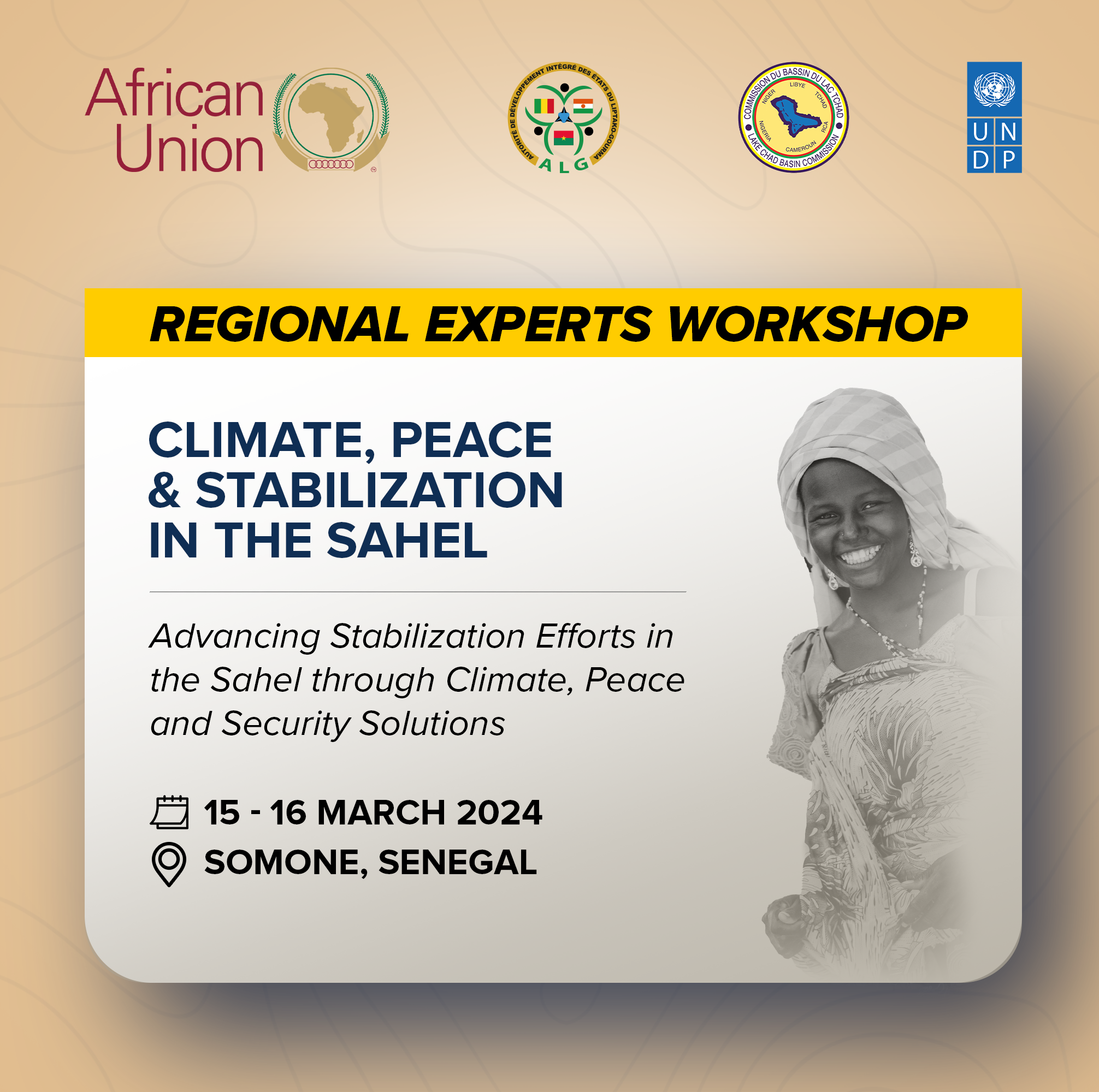Advancing Stabilization Efforts in the Sahel through Climate, Peace and Security Solutions
Regional Experts Workshop: Climate, Peace and Stabilization in the Sahel
March 10, 2024

Event Details
March 15, 2024
-
March 16, 2024
Somone, Senegal
Background and rationale
The Sahel region faces a deepening crisis from climate change and security challenges. The region is home to about 350 million inhabitants, and despite substantial natural resources (e.g., in mining and energy sectors, among others), 80% of its population live on less than $2 per day, with most of the countries in the region ranking among the least developed in the world. The region has been significantly affected by the impact of climate change. Three countries in the Sahel, Chad, Niger, and Mali, rank among the top seven most vulnerable countries to climate change. The Sahel region is expected to experience temperature increases 1.5 times greater than the world average. Indeed, the region has been identified as one of the world’s tipping points if the global average surface temperature rises by 3°C above pre-industrial levels. According to the IPCC, most climate scenarios show that temperatures in the Sahel will increase by at least 2°C in the near term (2021- 2040). The region is susceptible to recurrent droughts, land degradation, and erratic rainfall patterns, with severe consequences for agriculture and contributing to insecurity and displacement of food and water resources.
Climate-related challenges intertwine with a complex security situation marked by conflicts, political crises, violent extremism and terrorism, and clashes over resource control. The Sahel has also been marked by political instability, with coup d’états occurring in Mali, Burkina Faso, and Niger, among others, with questions of government legitimacy and accountability. The situation is made more difficult by sanctions against some of the military governments and the involvement of foreign mercenary groups, which undermine the rule of law. Climate impacts are crucial in understanding the complex multidimensional crisis in the Sahel and provide an essential lens for interpreting the root causes of insecurities, often underestimated. The proliferation of conflicts due to climate impacts is already visible. It is likely to increase as climate change exacerbates causes of insecurity and vulnerability, including access and management of natural resources, livelihoods deterioration and mobility (the displacement of people caused by the interplay of climate change and conflict, as well as their ability to move for resilience purposes in the face of seasonal fluctuations and other shocks and stress factors), among others.
Efforts towards stabilization have been multifaceted and aim to address the complex challenges of insecurity and terrorism, including managing cross-border dimensions. UNDP’s stabilization approach has focused on rebuilding trust between communities and legitimate authorities in areas affected by conflict, restoring a sense of normalcy, enabling safe return, preventing protracted displacement, breaking the reliance on protracted humanitarian cycles and laying the foundations for recovery, peace and development, and delivering time-bound, localized, integrated civilian-led interventions to enhance security, rehabilitate social and productive infrastructure and provide income support with speed and at scale. As stabilization is foundational, interventions in target locations are of short duration (18 months) and follow a staggered approach, as new stabilization locations are added after the end of the defined period. Once implementation has started, the short intervention period in each location demands the design of a transition strategy (already in its design phase), focusing on the government and other peace and development actors taking over the required support, including sustaining security, maintaining rehabilitated infrastructure and providing public services. It is essential to assess the willingness of national and subnational actors to provide the necessary support, and the transition strategy should enhance their capacities where required.
Objectives and approach
The proposed regional workshop will bring together experts from climate security, climate and disaster resilience, human mobility, governance/peacebuilding, and stabilization. The overarching objective of the workshop is to unpack the linkages between climate security and stabilization. In particular, it focuses on analysing and understanding how climate change impacts the security situation in a specific region and how integrated climate security and stabilization initiatives can, through clear and concrete actions/activities, be undertaken to create peace-climate co-benefits.
To achieve this objective, experts will examine stabilization interventions vis-a-vis climate security, explore opportunities for stronger coordination between the two initiatives, and propose concrete programmatic interventions that benefit the region’s stabilization and climate security situation.
The workshop will incorporate presentations, collective brainstorming, and group work. The presentations, discussion, and proposed sessions will help identify entry points and formulate clear priorities that can constitute the basis of a programmatic offer. Particular emphasis will be placed on building on good practice from the stabilization programme, especially concerning operating at speed and scale, recognizing that interventions should have maximum impact.
By unpacking the linkage and defining a set of possible programmatic responses, the workshop will propose an approach that addresses the challenges in the Sahel, which will have the potential to be replicated in other regions.
Key Expected Results
The event will be a two-day in-person workshop in Somone, Senegal, and the key expected results from the exercise are:
- Discussion and development of pathways to integrate climate security and stabilization programming,
- Collect inputs that will inform the development of a concept note that defines climate security and stabilization linkages, theory of change and programmatic entry points.
- Strengthened partnerships among key regional stakeholders, working on climate security and stabilization efforts, including potential development partners.

 Locations
Locations



